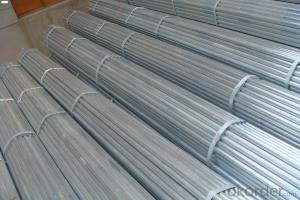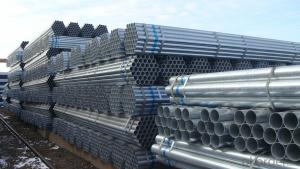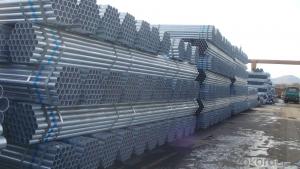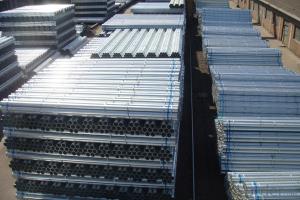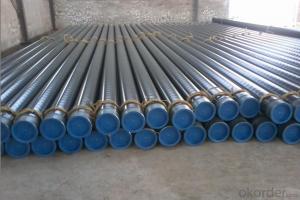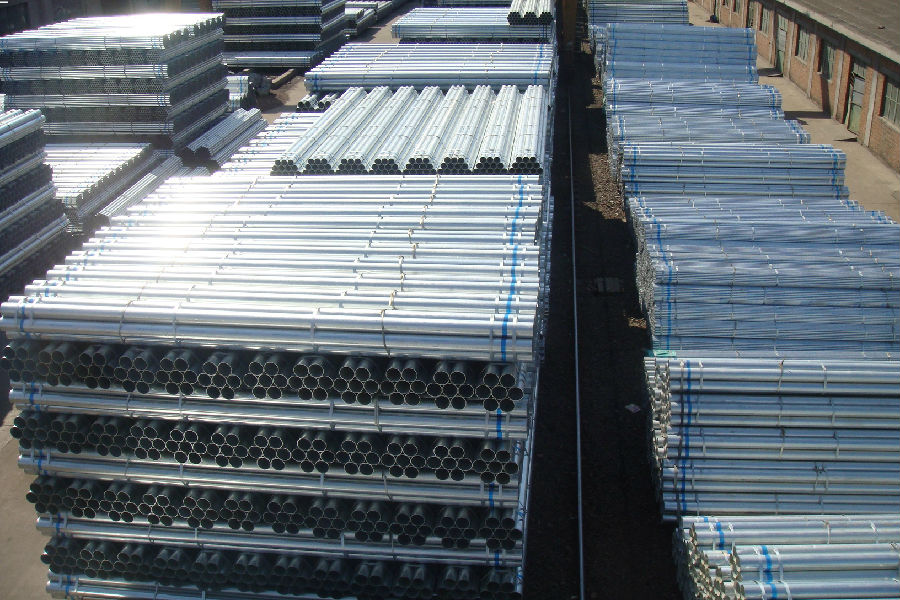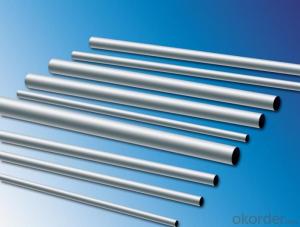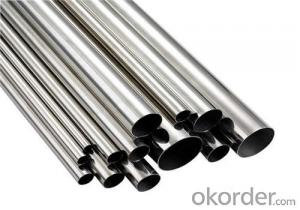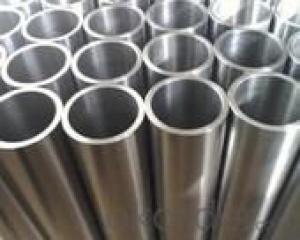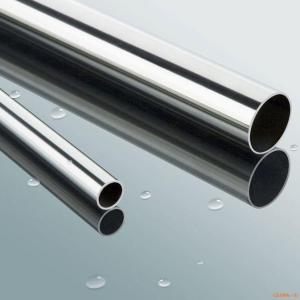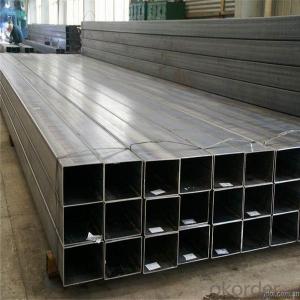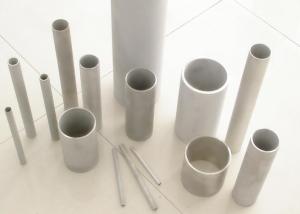Weld Steel Pipe & 24Inch Steel Pipe from okorder.com
- Loading Port:
- Tianjin
- Payment Terms:
- TT or LC
- Min Order Qty:
- 25 m.t.
- Supply Capability:
- 50000 m.t./month
OKorder Service Pledge
OKorder Financial Service
You Might Also Like
1. Structure of Weld Steel Pipe & 24Inch Steel Pipe Description:
Welded steel pipe are commonly welded by means of bent round, we can weld the steel into square and other shapes and then welded into the surface of the steel pipe seam. Steel plate or steel pipe is used in the blanks of welded steel. We can use electric arc welded pipe, high or low frequency electric resistance welded pipe, gas pipe, stove pipe, Bundy tubes according to different methods.
2. Main Features of the Weld Steel Pipe & 24Inch Steel Pipe:
·Reasonable price
·Relatively light weight
·Optional torsional strength
·Support high pressure
·Resist corrosion
3. The Weld Steel Pipe & 24Inch Steel Pipe Images:
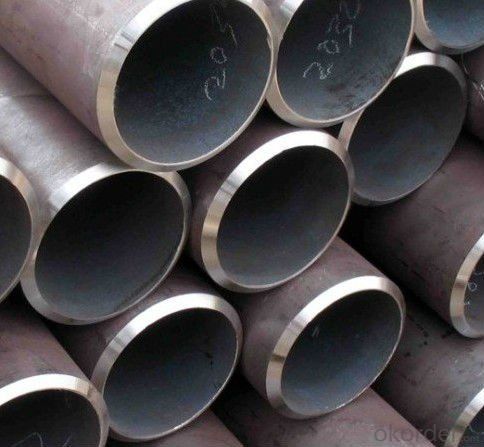
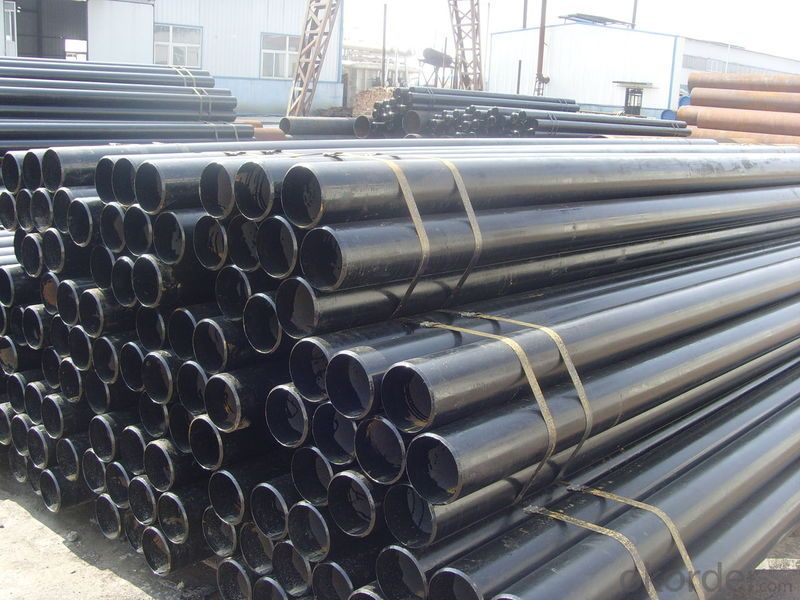
4. The Weld Steel Pipe & 24Inch Steel Pipe Specification:
Standard:
JIS, DIN, ASTM
JIS G3445-2006, JIS G3444-2006, JIS G3446-2004, DIN EN 10216-1-2004, DIN EN 10217-1-2005, DIN EN 10305, ASTM A106-2006, ASTM A53-2007, ASTM A789-2001, ASTM A1020-2002, ASTM A179-1990, ASTM A199Grade:
Cr-Mo alloy, 16Mn, ST35-ST52, STB35-STB42
15CrMo, 10CrMo910, 30CrMo, 16Mn, St37, St52, St42, St45, STB35, STB42Thickness:
2 - 30 mm
Section Shape:
Round
Outer Diameter:
10 - 568 mm
Secondary or Not:
Non-secondary
Application:
Structure Pipe
Technique:
Hot Rolled
Certification:
API
Surface Treatment:
Paint
Special Pipe:
API Pipe
Alloy Or Not:
alloy
Specifications
1.W.T from 2mm to 70mm
2.OD from 10 to 568mm
3.product by our own factory
4.on time dilivery
FAQ
black steel pipe black iron pipe steel tube astm pipe API
Q1: Could you tell me your loading port ?
A: Our factory is 470km away from Qingdao port ,China
and 400km away from Tianjin port,China.
but to save the domestic charges,we always choose Qingdao port to export.
Q2:Could you supply Mill Test Certificate?
A: Yes.We can. we can supply MTC, API 5L, API 5CT, ISO,Certificate of Origin
If your order need the inspetion by third party such as SGS,it is no problem.
Q3:Payment Terms?
A: We can accept T/T,D/P ,L/C,D/A.
But we need your 30% deposit to engine the production.
- Q: How are steel pipes used in the construction of underground parking structures?
- Steel pipes are used in the construction of underground parking structures for various purposes, such as providing structural support, drainage, and ventilation. They are commonly used as piles or caissons to support the weight of the structure and prevent it from sinking into the ground. Additionally, steel pipes are utilized for the installation of drainage systems to prevent water accumulation and ensure the structural integrity of the parking structure. They are also employed for ventilation purposes, allowing fresh air to circulate and remove any potentially hazardous gases. Overall, steel pipes are essential components in the construction of underground parking structures, ensuring their stability, safety, and functionality.
- Q: What are the common methods for repairing steel pipes?
- There are several common methods for repairing steel pipes, depending on the nature and extent of the damage. One common method is welding, which involves melting the damaged area and fusing it with a new piece of steel. This method is often used for small cracks or holes in the pipe. Welding can be done using various techniques such as shielded metal arc welding (SMAW), gas metal arc welding (GMAW), or tungsten inert gas (TIG) welding. Another method is pipe wrapping or bandaging, which involves wrapping a layer of adhesive tape or resin-soaked fiberglass around the damaged section of the pipe. This method is suitable for small leaks or corrosion spots and provides a temporary fix until a more permanent solution can be implemented. If the damage is extensive or the pipe is severely corroded, pipe lining or relining may be necessary. This involves inserting a new pipe liner inside the existing one, effectively creating a new pipe within the old one. This method can be done using various materials such as epoxy, polyethylene, or cured-in-place pipe (CIPP). Pipe lining is commonly used for larger diameter pipes or when replacement is not feasible. In some cases, pipe clamps or sleeves can be employed to repair minor leaks or cracks. These devices are designed to be clamped around the damaged section and provide a temporary or permanent solution depending on the severity of the damage. Ultimately, the choice of repair method depends on factors such as the extent of damage, accessibility of the damaged area, budget constraints, and the long-term durability required. It is advisable to consult with a professional pipe repair specialist to assess the specific situation and determine the most suitable method for repairing steel pipes.
- Q: What is the average lifespan of steel pipes?
- The average lifespan of steel pipes can vary depending on various factors such as the quality of the steel used, the environment in which they are installed, and the maintenance and care they receive. However, on average, well-maintained steel pipes can last anywhere from 50 to 100 years or more.
- Q: How do steel pipes compare to other materials like PVC or copper?
- Steel pipes have several advantages over other materials like PVC or copper. Firstly, steel pipes are incredibly strong and durable. They can withstand high pressure and extreme temperatures without cracking or bending. This makes them ideal for heavy-duty applications such as industrial piping systems or underground installations. Secondly, steel pipes have excellent corrosion resistance. Unlike copper pipes that can corrode over time, steel pipes are typically coated with anti-corrosive materials such as zinc or epoxy. This protective layer prevents rust and ensures a longer lifespan for the pipes. Furthermore, steel pipes offer superior fire resistance compared to PVC or copper. They are non-combustible and can withstand high temperatures for extended periods without deforming or releasing toxic gases. This makes steel pipes a safer option for applications where fire hazards are a concern. In terms of cost, steel pipes may be more expensive than PVC initially, but they offer better long-term value due to their durability and longevity. Copper pipes, on the other hand, can be quite expensive and are susceptible to theft due to their scrap value. Lastly, steel pipes are highly versatile and can be used in various applications, including water supply, sewage systems, gas pipelines, and oil refineries. They can handle high volumes of fluid with ease and are resistant to external factors like UV rays or physical impacts. Overall, steel pipes are a reliable and efficient choice for many industries and applications, offering strength, durability, corrosion resistance, fire resistance, and versatility that sets them apart from materials like PVC or copper.
- Q: What is the impact of temperature on steel pipes?
- The significance of temperature on steel pipes cannot be underestimated, as it can bring about both positive and negative consequences. When exposed to high temperatures, steel pipes undergo thermal expansion, which can result in distortion or buckling. This expansion also has the potential to affect joints and connections, leading to leaks or failures. Hence, it is imperative to take into consideration the coefficient of thermal expansion during the design and installation of steel pipes in environments with elevated temperatures. Conversely, steel pipes possess remarkable thermal conductivity, enabling them to endure high temperatures without substantial deterioration. This characteristic renders them suitable for applications where heat transfer is of utmost importance, such as in industrial processes or heating systems. Extreme cold temperatures also pose a threat to steel pipes. Freezing conditions cause water or other fluids within the pipes to expand, resulting in cracks or bursts. This can lead to leaks, fluid loss, and potential harm to surrounding structures. Consequently, it is necessary to implement appropriate insulation and preventive measures to ensure the integrity of steel pipes in cold environments. Moreover, temperature fluctuations can impact the mechanical properties of steel, including its tensile strength and toughness. Prolonged exposure to elevated temperatures can cause a phenomenon known as thermal degradation, which diminishes the steel's strength and renders it more susceptible to deformation or failure. In conclusion, temperature exerts a significant influence on steel pipes, affecting their structural integrity, thermal performance, and mechanical properties. Proper design, insulation, and maintenance are crucial to guarantee the safe and efficient operation of steel pipes under varying temperature conditions.
- Q: Can steel pipes be used for gas lines?
- Yes, steel pipes can be used for gas lines. Steel pipes are commonly used for gas lines due to their durability, strength, and resistance to extreme temperatures. They are able to withstand high pressure and are typically coated with corrosion-resistant materials to ensure the safety and longevity of the gas line system.
- Q: Can steel pipes be used for hydroelectric power plants?
- Yes, steel pipes can be used for hydroelectric power plants. Steel pipes are commonly used in hydroelectric power plants for various applications. They are primarily used in the penstock, which is a pipe that carries water from the reservoir to the turbine. The penstock is under high pressure, and steel pipes have the necessary strength and durability to handle the pressure and flow of water. Steel pipes are preferred in hydroelectric power plants due to their high tensile strength, corrosion resistance, and longevity. They can withstand the high-pressure conditions and flow rates of water, ensuring the efficient transfer of water from the reservoir to the turbine. Additionally, steel pipes have the advantage of being easily fabricated and installed. They can be customized to fit specific project requirements and can be welded or bolted together to form the desired length and shape. Furthermore, steel pipes are cost-effective compared to other materials commonly used in hydroelectric power plants, such as concrete or fiberglass. They provide a reliable and cost-efficient solution for conveying water in hydroelectric power plants, contributing to the overall efficiency and effectiveness of the power generation process. In conclusion, steel pipes are a suitable and commonly used material for hydroelectric power plants. They offer the necessary strength, durability, and cost-effectiveness required for conveying water from the reservoir to the turbine, making them an ideal choice for this application.
- Q: What are the different types of steel pipe supports for overhead piping?
- There are several types of steel pipe supports for overhead piping, including pipe hangers, pipe clamps, beam clamps, and pipe rollers. Pipe hangers are used to support vertical pipes, while pipe clamps provide support for horizontal pipes. Beam clamps are designed to attach to structural beams and provide support for the pipe. Pipe rollers are used to allow the pipe to move freely, accommodating expansion and contraction.
- Q: What is the difference between black steel pipe and galvanized steel pipe?
- The main difference between black steel pipe and galvanized steel pipe lies in their coating. Black steel pipe is untreated and has a dark, matte appearance, while galvanized steel pipe is coated with a layer of zinc to prevent rusting and has a silver, shiny appearance. This coating makes galvanized steel pipes more durable and suitable for outdoor use, while black steel pipes are commonly used for indoor plumbing and gas lines.
- Q: How are steel pipes protected against electromagnetic interference?
- Steel pipes can be protected against electromagnetic interference by applying a layer of insulating material around the pipes or by utilizing electromagnetic shielding techniques such as wrapping the pipes with conductive materials. Additionally, grounding the pipes and implementing proper grounding practices can help minimize the impact of electromagnetic interference.
Send your message to us
Weld Steel Pipe & 24Inch Steel Pipe from okorder.com
- Loading Port:
- Tianjin
- Payment Terms:
- TT or LC
- Min Order Qty:
- 25 m.t.
- Supply Capability:
- 50000 m.t./month
OKorder Service Pledge
OKorder Financial Service
Similar products
Hot products
Hot Searches
Related keywords
